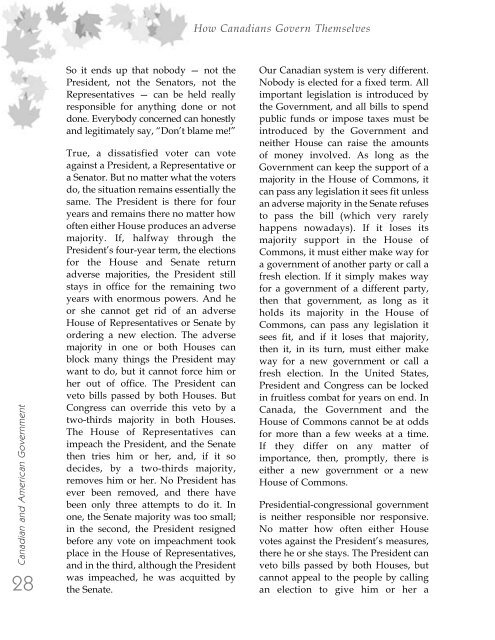How Canadians Govern Themselves - Parlement du Canada
How Canadians Govern Themselves - Parlement du Canada
How Canadians Govern Themselves - Parlement du Canada
You also want an ePaper? Increase the reach of your titles
YUMPU automatically turns print PDFs into web optimized ePapers that Google loves.
<strong>How</strong> <strong>Canadians</strong> <strong>Govern</strong> <strong>Themselves</strong>Canadian and American <strong>Govern</strong>ment28So it ends up that nobody — not thePresident, not the Senators, not theRepresentatives — can be held reallyresponsible for anything done or notdone. Everybody concerned can honestlyand legitimately say, “Don’t blame me!”True, a dissatisfied voter can voteagainst a President, a Representative ora Senator. But no matter what the votersdo, the situation remains essentially thesame. The President is there for fouryears and remains there no matter howoften either House pro<strong>du</strong>ces an adversemajority. If, halfway through thePresident’s four-year term, the electionsfor the House and Senate returnadverse majorities, the President stillstays in office for the remaining twoyears with enormous powers. And heor she cannot get rid of an adverseHouse of Representatives or Senate byordering a new election. The adversemajority in one or both Houses canblock many things the President maywant to do, but it cannot force him orher out of office. The President canveto bills passed by both Houses. ButCongress can override this veto by atwo-thirds majority in both Houses.The House of Representatives canimpeach the President, and the Senatethen tries him or her, and, if it sodecides, by a two-thirds majority,removes him or her. No President hasever been removed, and there havebeen only three attempts to do it. Inone, the Senate majority was too small;in the second, the President resignedbefore any vote on impeachment tookplace in the House of Representatives,and in the third, although the Presidentwas impeached, he was acquitted bythe Senate.Our Canadian system is very different.Nobody is elected for a fixed term. Allimportant legislation is intro<strong>du</strong>ced bythe <strong>Govern</strong>ment, and all bills to spendpublic funds or impose taxes must beintro<strong>du</strong>ced by the <strong>Govern</strong>ment andneither House can raise the amountsof money involved. As long as the<strong>Govern</strong>ment can keep the support of amajority in the House of Commons, itcan pass any legislation it sees fit unlessan adverse majority in the Senate refusesto pass the bill (which very rarelyhappens nowadays). If it loses itsmajority support in the House ofCommons, it must either make way fora government of another party or call afresh election. If it simply makes wayfor a government of a different party,then that government, as long as itholds its majority in the House ofCommons, can pass any legislation itsees fit, and if it loses that majority,then it, in its turn, must either makeway for a new government or call afresh election. In the United States,President and Congress can be lockedin fruitless combat for years on end. In<strong>Canada</strong>, the <strong>Govern</strong>ment and theHouse of Commons cannot be at oddsfor more than a few weeks at a time.If they differ on any matter ofimportance, then, promptly, there iseither a new government or a newHouse of Commons.Presidential-congressional governmentis neither responsible nor responsive.No matter how often either Housevotes against the President’s measures,there he or she stays. The President canveto bills passed by both Houses, butcannot appeal to the people by callingan election to give him or her a




